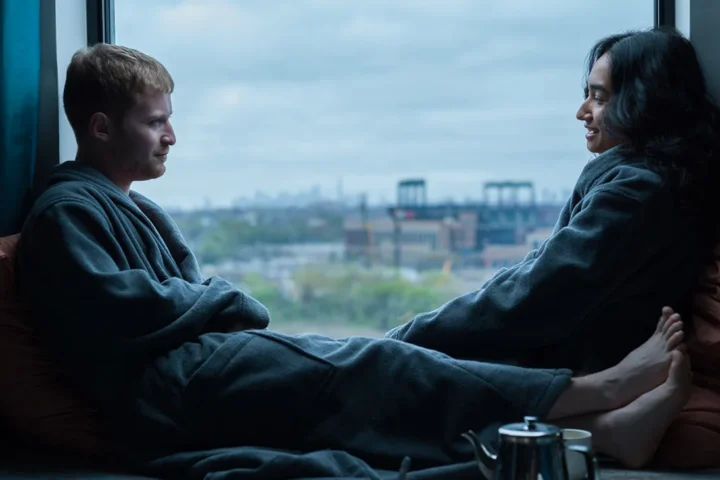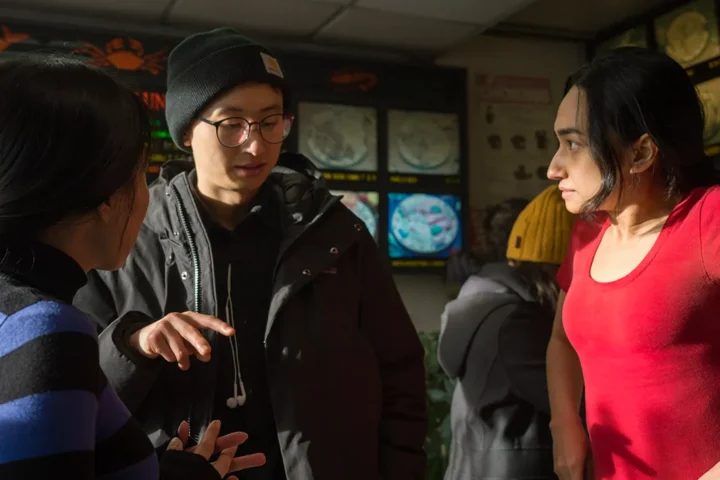Looper is an inventive sci-fi picture that asks a few provocative questions, mainly—if your future self traveled back in time and you were able to meet, what might happen? If it doesn’t exactly deal with that paradox, it nonetheless provides a high-concept and imaginative story told with arresting visuals and a surprising third-act that gives us something we didn’t expect (human beings, not explosions).
A long-time project of writer/director Rian Johnson (Brick, The Brothers Bloom), Looper features Joseph Gordon-Levitt as a time traveling hit man (or “looper”) living in the year 2044 (the past) who works as an executioner for the mafia of 2074 (the present). Time travel has been invented in the future, and outlawed, now controlled by organized crime. So why not just kill someone in 2074? Apparently it’s harder to dispose of bodies, so an elaborate kill process has been engineered.
Criminals are sent from 2074 to 2044 while a Looper waits at a given time aside a rural cornfield. When the hooded criminal appears from thin air, the looper shoots him dead with a shotgun. Clean, simple, quick. Yet complications frequently ensue when the looper is required to kill his future self—to dispose of the ultimate future witness to the crime—and this tantalizing idea is the engine that drives this exciting picture.
Joe (always excellent Joseph Gordon-Levitt, under pounds of make-up apparently meant to suggest a young Bruce Willis; it doesn’t) is the best looper in the business, getting the job done efficiently, time and time again. But when his adult counterpart, Old Joe (Bruce Willis), shows up as his victim, he flinches—and Old Joe goes on the run.
Turns out Old Joe has some unfinished 2044 business of his own, and through an intricate flashback sequences we see his life play out, including marriage to the wife and love of his life (Summer Qing). When she’s murdered by a mysterious figure known only as The Rainmaker, Old Joe’s mission in life is to find the adolescent version of this killer and eliminate him, therefore resurrecting his wife and returning his life to the correct path. The loop remains open as the two men grapple with staying alive.
And then there is an intriguing character played by Emily Blunt, who can do about anything in the movies, utterly convincing as a Midwestern farm girl named Sara, formerly strung out but now a reformed single mother to Cid (Pierce Gagnon), a “special” child with some very serious issues and gifts. Joe shacks up there for a while and the pair grow closer, but there are secrets to be revealed, and they are sufficiently surprising, grisly and nearly apocalyptic.
There are strong supporting turns by Paul Dano, who also fails to close his loop and pays dearly for it, and Jeff Daniels as the mob’s kingpin who knows his future destiny, and the actor’s natural warmth effectively works against type, giving the character much unpredictability.
With its internal logic working overtime to sidestep any potential time-travel loopholes, the film misses an opportunity to explore any deep or rich Big Questions, the kind one would imagine you might want to know if you ever got to meet your older self: What will be the speed bumps in life? What really matters when you get to the end? Did it really pay off to stop smoking?
No matter, if Looper isn’t exactly deep, it has its great Blunt performance and so much visual pizzazz, ideas and clever cinematography that you can’t help but be impressed—the picture works overtime to ensure it.



